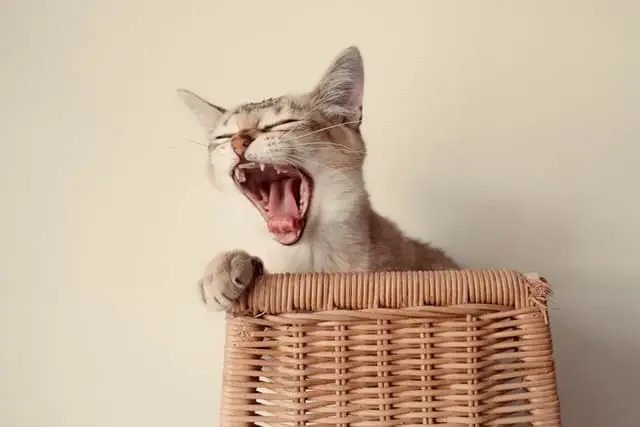
A very frequent question is: why does our cat meow? For many of us the answer is simple, because he is a cat! For others, however, there is a scientific reason behind any action of our animal. We assume that the kitten‘s meow is different from the adult cat’s meow. The meows change according to the different situations in which the cat finds itself. Obviously, the frequency of miracles varies according to the breed of the cat and the sex.
Oriental breeds are considered to be the most talkative ones, while European breeds are considered to be the most sly and therefore those that use vocalizations more similar to a gesture of affection. Many cats like to converse with their owner, while others want to communicate with the rest of their feline companions. So those who don’t like a meow better avoid getting a cat! Obviously, if you notice that your cat will tend to meow too often and frequently, there will certainly be behavioral reasons behind it, so it will be advisable to read the sheet on how to educate your cat.
What are the reasons for cat meowing?

Cats meow for a variety of reasons, which can vary based on the severity of the situation or the demand for attention. Among these reasons we find:
An illness: it will be advisable to take our cat to the vet for a more detailed visit. Sometimes cats meow out of pain or impatience. Especially elderly cats that over time can develop even serious pathologies that can lead to excessive hypervocalization.
Request for attention: Despite the vast majority of people think that the cat is an opportunistic and solitary animal, on the contrary, our beloved feline animal is very sociable and loves being in company especially when he lives alone and without other cats. Cats meow to invite their companion to play with them or they meow because they are hungry and therefore attention is required. To avoid finding ourselves with an extremely meowing cat we should forget to respond to his attention calls. Give your attention only when the cat is calm and peaceful, however, dedicate some time to play, let him let off steam and create fun activities with him that develop his brain.
Request for food: Many cats meow at the simple noise of the bag of kibble and this will begin to associate a meow with hunger. Other cats, on the other hand, meow directly when someone enters the kitchen or looking for food, it would be advisable not to feed your cat at that moment because it amplifies his behavior. Wait for him to calm down before putting the food in the bowl and, above all, don’t give him something to nibble on every time he meows. If this strategy doesn’t work, you can try a food vending machine that opens automatically at set times. By doing so, the cat will meow at the dispenser and not at you.
Affection: Many cats love to reciprocate the effusions of love with their owner for this they use the habit of meowing when they are happy to see us. Many cats meow when family members come home or just when they meet them around the house. This habit is difficult to eradicate, but try to see it as if your cat is saying to you, “I’m happy to see you.”
Sadness and loneliness: If you own a cat that spends too many hours alone, you may experience lances, there is the loneliness of your kitty reflected in meowing. Surely if you have a neighbor he can confirm that your cat, when left alone, will tend to meow more than expected.Cats that meow, because they feel alone, very often try to tease, or risk putting themselves in danger. If your cat spends too many hours a day alone, try to find some way to enrich his life or ask a pet sitter.
If your cat lives in the garden there will be no need to entertain his day he would just go hunting for birds and lizards; But if the cat lives in the apartment we will have to find some tricks to let him pass the time which can vary from: pull scratches 1.60 cm high, to snack balls with small tidbits to entertain him during the day, or even place bird feeders outside the window. so that he can watch the birds eat.
Anxiety or Stress: Cats who experience stress often tend to vocalize more. The arrival of a new pet, a baby, a move, an illness or the loss of a loved one are among the triggers. We should find out what are the stressful events for the cat and try to avoid as much as possible perhaps even with the help of gradual release pheromones that can be attached to the power outlet such as the FELIWAY.
Seniority and old age: Cats just like people can suffer from loneliness as they age they become disoriented, they no longer have the balance, so they very often meow, to demand attention. It can be a need for help, especially during the night.
Mating and Warmth: During the well-known “mating season”, the vocalizations of cats (both male and female) are more intense and frequent. Sometimes, it can be infuriating to live with such vocal manifestations. It is possible to remedy this by sterilizing the animal.
What should we avoid?
Finally, we should always distinguish meows due to lack of attention from those due to health problems. Although the meows can be frequent and annoying we should somehow try to prevent the cat from taking them as habits. We must always check when the cat meows to avoid that they are not diseases. We must never punish the cat for meowing! Hitting, shouting, spraying the cat with water, are methods that rarely work and will tend to stress the animal more. Don’t always indulge the cat. If the cat is used to getting what he wants by meowing, it is obvious that he will tend to vocalize more and more intensely when needed.






